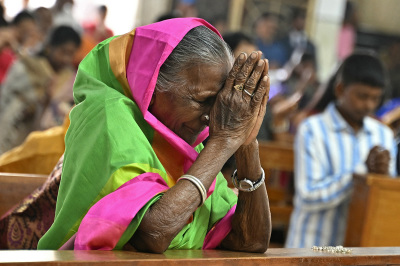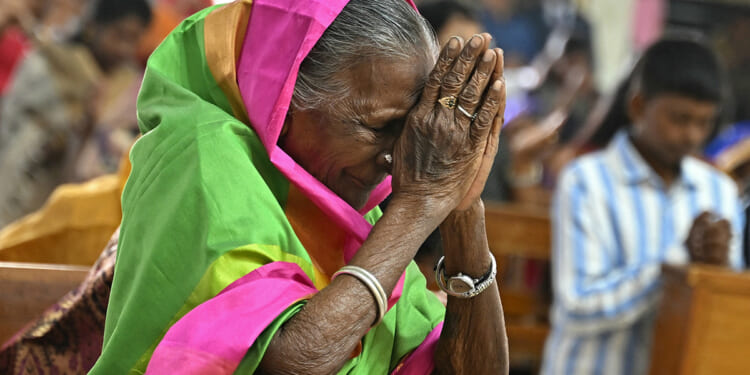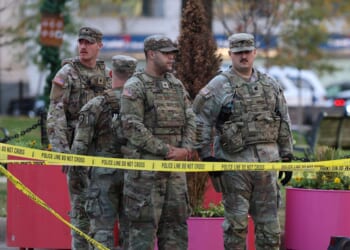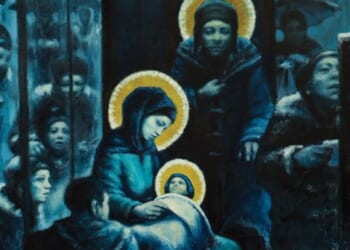
Every year when the International Day of Prayer for Persecuted Christians (IDOP) approaches, I’m reminded that this isn’t just another date on the church calendar. It’s a chance to join hands and hearts with our Christian brothers and sisters who are suffering for their faith.
Praying for them is not a symbolic gesture. It is a source of real strength. This month I spent time with Christians in South Asia who have been imprisoned, beaten or stood beside the bodies of murdered loved ones because they follow Christ. I’ve done this work for 27 years, and when I’ve asked how we, American believers, can help these members of our family, their first request is simple and consistent: “Pray for us.”
1. Because Scripture commands us to
The call to pray for persecuted Christians is an urgent, ongoing mandate from the Word of God. Hebrews 13:3 urges us, “Remember those who are in prison, as though in prison with them, and those who are mistreated, since you also are in the body.” This command is more than empathy; it is identification. To be “in the body” means that when one member suffers, we all suffer (1 Corinthians 12:26). As if you were forced from your village. As if you were in the urine-soaked prison cell. As if you were beaten, your clothes stained with your own blood.
Psalm 79:11 pleads of the Lord, “Let the groans of the prisoners come before you; according to your great power, preserve those doomed to die.” These groans still rise today. From North Korean prison camps to sweltering Eritrean shipping container cells, from underground churches in Iran to Christians displaced by radical extremist violence in Nigeria, the cries of our brothers and sisters reach the throne of God. On IDOP and throughout the year, will you pause to remember the groans of these suffering saints? Will you groan with them in prayer?
Paul, writing from chains, repeatedly asked the church to pray: “Brothers, pray for us” (1 Thessalonians 5:25). “Pray also for us, that God may open to us a door for the word, to declare the mystery of Christ, on account of which I am in prison” (Colossians 4:3). And Jesus commanded not only prayer for those suffering but also those who cause the suffering: “Love your enemies and pray for those who persecute you” (Matthew 5:44). Prayer is more than just an act of support — it is an act of obedience.
We often pray for comfort, safety and protection. While those are good prayers — I also pray for those things — persecuted Christians don’t ask us to pray that their persecution will end. Instead, they ask for faithfulness amid the persecution. Their prayer is not “Lord, deliver us from the fire” but instead “Lord, walk with us in the fire.” When we pray in alignment with their requests, we join them as co-laborers in their testimony.
2. Because they have asked us to
When I visit persecuted Christians and ask, “How can believers in America help you?” the first answer is always the same: “Pray for us.” Their first request is not for resources, advocacy or rescue. They earnestly ask for prayer.
Why? Because in the deepest places of their suffering, their greatest fear is not death — it is being forgotten. One of the enemy’s most insidious lies whispered to persecuted believers is this: “No one remembers you. You are all alone.” Our prayers wage war against that lie. Our prayers remind our brothers and sisters that the global body of Christ stands with them, that they are not abandoned, and that their suffering is seen both on earth and in Heaven.
Many who have endured imprisonment for the Gospel’s sake testify that they could feel the prayers of the saints. In dark cells where no letters could reach them, where no news could pass, they sensed a strength that was not their own. That strength, they say, came in answer to prayer.
I hope, as Nov. 2 approaches, that you and your church will join in this global day of prayer with Scripture guiding us. Let us “remember them,” as the writer of Hebrews says, until every Christian in chains for their faith in Christ knows that they are not alone.
When we pray for persecuted Christians, we enter a holy partnership, linking arms with believers we may never meet here on earth but with whom we will spend all eternity. When we answer and obey Scripture’s call, we honor the heartfelt request of those who are suffering for the Gospel.
Step into their stories. Speak the names of your persecuted brothers and sisters in prayer. Pray that God will give them courage, boldness and the assurance that they are not, and will never be, forgotten.
Todd Nettleton is Vice President for Message at The Voice of the Martyrs and host of The Voice of the Martyrs Radio. He is the author of When Faith Is Forbidden: 40 Days on the Frontlines with Persecuted Christians.
















